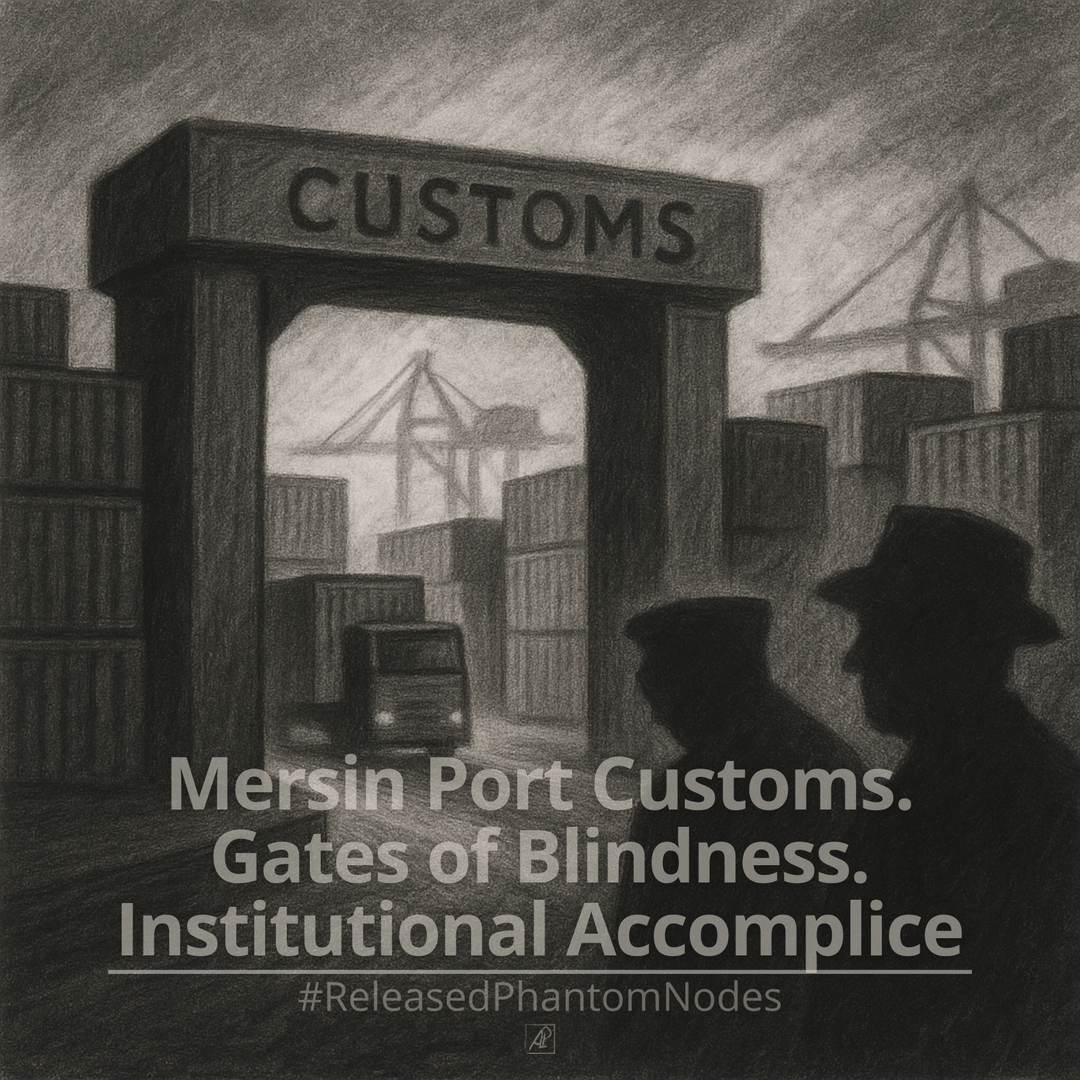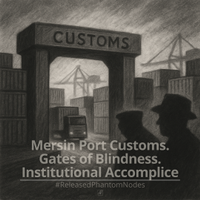
🕳️ Released Phantom Node 53: Mersin Port Customs. Gates of Blindness. Institutional Accomplice
- Foundation date
11 September 2025
This project is a philosophical and artistic study of the phenomenon of "phantom nodes" — invisible yet influential objects and subjects in the contemporary global system. The descriptions contained within this study are metaphorical and allegorical, aimed at uncovering systemic problems, regimes, and civilisational influences. They are not a journalistic investigation or legal accusations, but serve as an artistic interpretation of reality.
🕳️ Released Phantom Node 53: Mersin Port Customs. Gates of Blindness. Institutional Accomplice
A customs office that turns the border into an illusion of security.
Who is this?
The customs of Mersin Port are not just corrupt officials but an institution that deliberately ignores illicit flows.
Its role is to legitimize shadow schemes and provide “green corridors” for prohibited cargo.
Type of node:
State institution, logistic control.
Status:
Above the law, shielded by the state.
Form of control:
Corrupt ties, special zones, bureaucratic loopholes.
Phantom image:
A gate opening wide to everything that should be stopped.
What remains after the phantom:
A shadow infrastructure and deep mistrust in institutions.
Core of the node:
What sustained it?
Corruption within state organs, political deals, geopolitical ambitions.
How did it become a phantom?
Lost its controlling role and turned into a symbol of “conscious blindness.”
Why does the phantom still exist?
Systemic benefits for elites profiting from war and sanctions evasion.
Phantom’s condition:
Active, legalized through state status.
After the regime:
Documented cases of forged invoices.
Exposure of “green corridors.”
Collapse of trust in customs authorities.
Collective reaction:
We see how the state itself becomes complicit in crime.
We mark this node so memory will not let it be whitewashed.
Core principle:
When state borders are blind, they actively support war.
Alt-text:
Drawing of Mersin Port with dark customs gates. Containers pass without inspection, shadows of officials turn away. Atmosphere of institutional blindness and state complicity.
#Phantom #Customs #Mersin #GreyZone #Turkey #ShadowEconomy #Corruption #Logistics #Port #War #Crimes #Trade #Sanctions #Evasion #PhantomNode #PivtorakStudio #Shadow #Ghost #Geopolitics #Kleptocracy #PhantomCustoms #GatesOfBlindness #InstitutionalBlindness #ShadowNetwork #Ports #GreenCorridors #ForgedDocuments #CustomsSchemes #SystemPhantom
Unmasking the Phantom. Pivtorak.Studio. 11.09.2025
https://www.instagram.com/pivtorak.studio
🛡️ This project is an artistic and philosophical exploration.
All descriptions are allegorical in nature.
🫧Phantom Node Dossier: Mersin Port Customs. The Gate of Blindness.
Key Aspects of the Phantom:
"The Gate of Blindness" (or "Institutional Accomplice"). This phantom symbolizes a government body that, instead of protecting borders and upholding the law, deliberately becomes an instrument for criminal activity. Mersin Port Customs, as a critically important transit hub, embodies not so much the corruption of individual officials, but rather an institutional "deliberate blindness" and complicity. Its phantom essence lies in the fact that it exists as an official state institution, but its real function is to ensure the unimpeded flow of illegal cargo.
Regimes (which it directly shapes/supports):
💡 Regime of "Deliberate Blindness": The customs office is the physical embodiment of this regime, as it allows goods to pass without proper inspection, asking no difficult questions about their origin or final destination.
🤝 State Protectionism for Crime: It demonstrates how a state can tacitly or actively facilitate shadow schemes, providing them with "state protection" and legitimizing them.
👻 Shadow Geopolitics: It supports the aggressor's geopolitical ambitions by allowing the transfer of military components used for warfare.
💰 Kleptocracy: The customs office's activities create conditions for the prosperity of kleptocratic elites who use these channels to circumvent sanctions.
Tools (which it actively uses/oversees):
✍️ Permissibility of Document Forgery: The main tool is the conscious ignoring of forged invoices and customs declarations.
🕵️ Lack of Customs Inspection: A key tool is the absence of a real inspection of goods, which allows prohibited items to be transported under the guise of others.
📄 Bureaucratic Vacuum: The creation of special "green corridors" or the use of bureaucratic procedures that allow for "legal" circumvention of control.
🤝 Corrupt Connections: It relies on corrupt ties between customs officials, logistics companies, and shadow traders.
Civilizational Influences (which it embodies/exploits):
💔 Destruction of Trust in Institutions: The customs office's activities undermine trust in state institutions globally, showing their inability or unwillingness to uphold international law.
⚖️ Institutionalized Lawlessness: It is an example of how lawlessness can be not only individual behavior but also a state-supported system.
⛓️ Encouragement of Criminality: By ensuring impunity, the customs office encourages other companies and individuals to participate in shadow schemes.
💥 Complicity in Crime: Mersin Port Customs becomes an accomplice to war crimes, by allowing the transfer of goods used for murder and destruction.
Dissection of a Phantom Node. Pivtorak.Studio. 11.09.2025
https://www.instagram.com/pivtorak.studio
🛡️ This project is an artistic and philosophical exploration.
All descriptions are allegorical in nature.

